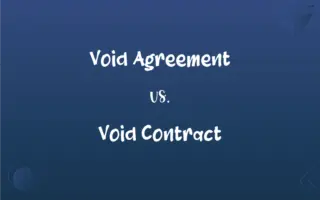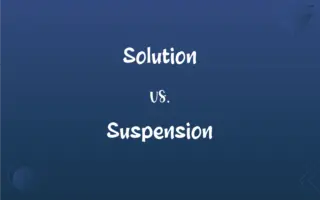Absolute vs. Relative: What's the Difference?
Edited by Aimie Carlson || By Janet White || Updated on November 28, 2023
Absolute refers to something total, independent, or not relative; relative means something is considered in relation or proportion to something else.

Key Differences
Absolute implies something that is complete, total, or universally true without any dependence on external factors. However, relative indicates that something is dependent on or compared to another reference point or standard.
In mathematics, absolute values represent the magnitude of a number regardless of its sign, while relative values express the size of a quantity in relation to another. In ethics, absolute morality means fixed ethical rules, while relative morality suggests ethical decisions depend on the context.
Absolute stands on its own, independent of external conditions or comparisons. Meanwhile, relative varies depending on the circumstances or relationships it is compared to.
In terms of perception, absolute can refer to an unchanging, fixed standard. In contrast, relative perception changes based on the situation or comparative standards.
Absolute truths or principles are seen as unalterable and universally applicable, while relative truths or principles can change depending on different cultures, times, or situations.
ADVERTISEMENT
Comparison Chart
Definition
Independent, not influenced by external factors
Dependent on, or in relation to, something else
Usage in Fields
Absolute values in math; absolute morality in ethics
Relative values in math; relative morality in ethics
Dependence
Independent of external conditions
Dependent on external conditions or comparisons
Perception
Unchanging, fixed
Changes based on comparative standards
Philosophical Context
Universally true or applicable principles
Context-dependent truths or principles
ADVERTISEMENT
Absolute and Relative Definitions
Absolute
Complete in itself, total.
His victory was absolute, with no doubts about the outcome.
Relative
Considered in relation or in proportion to something else.
The success of the project is relative to the team's effort.
Absolute
Not qualified or diminished in any way; total.
She had absolute confidence in her team's abilities.
Relative
Dependent on the context or circumstances.
Relative poverty is measured against the societal average.
Absolute
Having unrestricted power.
The absolute monarch ruled without any checks on his power.
Relative
Not absolute or independent; comparative.
Her happiness is relative to her recent experiences.
Absolute
Independent from external references or relationships.
In mathematics, the absolute value reflects a number's real magnitude.
Relative
Existing or having its specific nature only by relation to something else.
In physics, motion is often described as relative.
Absolute
Unconditionally true or valid.
He believed in the absolute truth of scientific facts.
Relative
A term denoting a relationship to something specified.
In grammar, a relative clause modifies a noun.
Absolute
Unqualified in extent or degree; total
Absolute silence.
Relative
Considered in comparison or relation to something else
An animal with a large brain relative to body size.
The relative quiet of the suburbs.
Absolute
Not limited by restrictions or exceptions
An absolute right.
Relative
Having pertinence or relevance; connected or related
How are those remarks relative to the discussion?.
Absolute
Being fully such; utter
An absolute fool.
FAQs
What does 'relative' mean?
'Relative' means something is dependent on or compared to something else.
How is 'relative' used in physics?
It's used to describe measurements or conditions in relation to a specific frame of reference.
Is 'absolute' synonymous with 'total'?
Yes, in many contexts, 'absolute' implies totality or completeness.
What does 'absolute' mean?
'Absolute' refers to something complete, total, or independent of external conditions.
Can 'absolute' be used in science?
Yes, as in 'absolute zero,' referring to the lowest possible temperature.
Can 'relative' imply comparison?
Yes, 'relative' often involves comparison to another entity or standard.
What is an example of 'relative' in everyday language?
"Her speed is fast relative to mine."
Can something be 'absolute' in philosophy?
Yes, like 'absolute principles,' which are considered universally valid.
Are 'absolute' values always positive in math?
Yes, an absolute value reflects the magnitude of a number, disregarding its sign.
What is 'relative humidity'?
It's the amount of moisture in the air compared to the maximum it can hold at that temperature.
Does 'absolute' have a religious context?
Yes, it can refer to beliefs considered unconditionally true in a religious context.
Is 'absolute' freedom possible?
The concept is debated, as freedoms typically have societal or legal boundaries.
How is 'relative' used in economics?
Like in 'relative poverty,' which compares an individual's income to the societal average.
What's 'relative velocity'?
It's the velocity of an object as observed from a particular frame of reference.
How does 'absolute' relate to truth?
An 'absolute truth' is something considered universally true, regardless of circumstances.
How does 'relative' apply to moral beliefs?
'Relative' morality suggests ethical standards vary based on cultural or situational factors.
Can 'relative' describe music?
Yes, in terms of pitch or harmony, as in 'relative major and minor keys.'
Can 'relative' refer to family members?
Yes, 'relatives' are people who are connected by blood or marriage.
Is 'absolute' used in law?
Yes, as in 'absolute liability,' where responsibility is independent of fault.
Can 'absolute' denote a monarch's power?
Yes, as in 'absolute monarchy,' where the ruler has complete authority.
About Author
Written by
Janet WhiteJanet White has been an esteemed writer and blogger for Difference Wiki. Holding a Master's degree in Science and Medical Journalism from the prestigious Boston University, she has consistently demonstrated her expertise and passion for her field. When she's not immersed in her work, Janet relishes her time exercising, delving into a good book, and cherishing moments with friends and family.
Edited by
Aimie CarlsonAimie Carlson, holding a master's degree in English literature, is a fervent English language enthusiast. She lends her writing talents to Difference Wiki, a prominent website that specializes in comparisons, offering readers insightful analyses that both captivate and inform.

































































